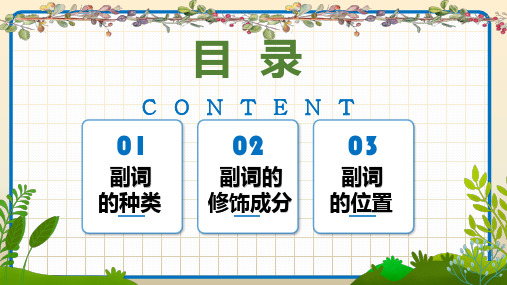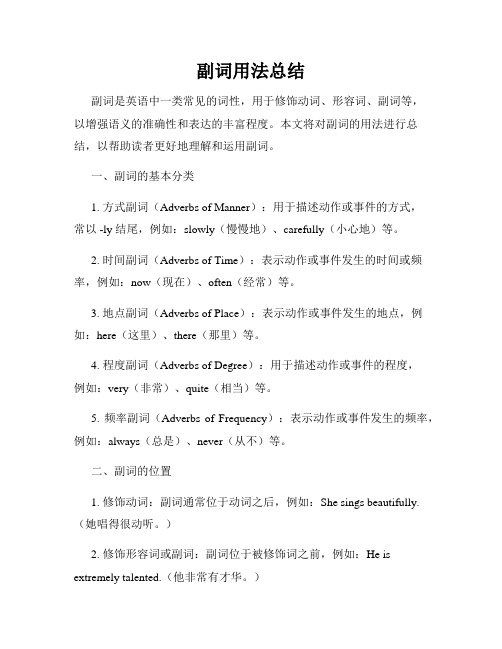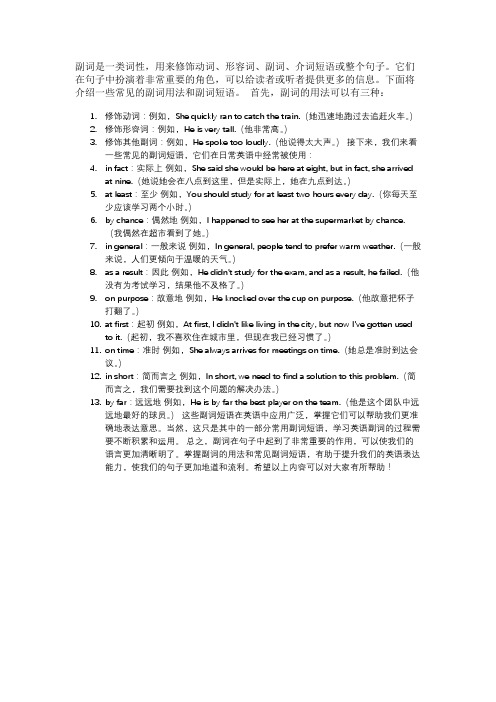英语-12副词的基本用法
英语副词的用法大全

英语副词的用法大全副词在句中可用作:1)状语(这是副词在句子中的主要功用)It is raining hard.雨下得很大。
(副词hard作状语,修饰动词is raining。
) Don't drive too fast.车子不要开得太快。
(fast是副词,作状语,修饰动词drive,副词too又修饰副词fast。
)He speaks English quite well.他英语讲得相当好。
(well修饰动词speaks,quite又修饰副词well。
)This is a fairly useful tool,这是一件相当有用的工具。
(fairly修饰形容词useful)He has always helped his sister with her homework.他一向帮助他妹妹做家庭作业。
(always修饰动词has helped)She often went there.她常到那儿去。
(often和there均是副词,修饰动词went。
)Perhaps he will telephone later.也许他以后会打电话来的。
(perhaps 是副词,用以修饰全句。
)2)表语Is he up?他起床了没有?She is out.她出去了。
3)定语Life here is full of joy.这儿的生活充满了欢乐。
(here修饰名词life) 副词的位置1)修饰动词时,有三种位置。
2)修饰形容词和副词时,须放在被修饰词之前。
如:It is a rather difficult job,这是一件颇为困难的工作。
(rather修饰形容词difficult)He runs very fast.他跑得很快。
(very修饰副词fast)3)副词作定语时,一般放在被修饰的名词之后。
如:The peasants there are busy digging a canal now.那里的农民现在正忙于修水渠。
初中英语语法课件-副词的基本用法

频度副词
usually 通常 never 从来不 ever 曾经
often 经常 sometimes 有时 always 总是 hardly 几乎不 rarely 极少 seldom 极少
疑问副词
how 怎样
when 什么时候 where 哪里
why 为什么 how 如何
how long 多长
how often 多久一次 how far 多远
4. 副词修饰基数词时,通常放在被修饰基数词的前面。 Her grandpa is over eighty, but he is healthy. 她的爷爷八十多岁了,但是很健康。
1. The night was very ___, so he had to take off
his shoes ___.
2. 副词修饰形容词时,通常放在该形容词的前面。 He is a very funny boy. 他是一个非常有趣的男孩。 The boy is too young. He can’t carry the heavy box. 这个男孩太小。他搬不动这个重箱子
3. 副词修饰其它副词时,通常放在被修饰副词的前面。 The girl swims very well. 这个女孩游泳游地得非常好。 He works very hard. 他工作非常努力。
4. How ___ the girls are playing! A. happy B. happier C. happyly D. happily
THE END
A. quiet; quietly B. quite; quickly
C. late; quick
D. quite; quietly
2. I saw the film two days ___. A. ago B. before C. after D. late
英语九年级【知识精讲】12,形容词副词(2)副词的基础用法

2. 频度副词 频度副词表示时间的经常性程度,常见的频度副词有: never, seldom, sometimes, often, usually, always等。 如: He has never been to Beijing.
Sometimes I get up early.
3. 地点副词 地点副词通常用来表示动作发生的地点。 常见的地点副词有:here, there, inside, outside, upstairs, downstairs, anywhere, everywhere, nowhere, somewhere, down, up, off, on, in, out等。 如:I met an old friend of mine on my way home.
【知识精讲】副词的基础用法
初三 英语
时间副词
程度副词
副词的分类
地点副词
方式副词
频度副词 副
疑问副词 词
作状语
作表语
副词的用法
作定语
作宾语补足语
一、副词的基本特征 1. 大多副词是形容词后+ly构成:quickly; slowly; bravely 2. 以y结尾的形容词把y变i + ly:happy—happily; angry—angrily 3. 有些副词没有特殊的词尾:now; often; here; quite; never; very 4. 有些副词与形容词相同:late; early; high; long 5. 只有可以分成比较等级的副词才可以有比较级和最高级形式, 像only, really, there, here没有比较等级。
2. 频度副词作状语时,通常放在行为动词之前,情态动词,助动词和be动
中考英语复习---副词用法和位置

3. sometime: at one time or another, at some indefinite time;
sometimes: at times, now and then Come over and see us sometime. I shall go to see her sometime next month.
as soon as she gets home. (immediate) 14. The teacher told the students not to talk ________ in the library. (loud) 15. __________, he caught the last bus to his hometown. (luck)
Tomorrow, I will go downtown.
6. 地点副词通常置于句尾,有时可置于句首,一般 不置于句中。
The children are playing upstairs. Here the speaker paused for a while.
注意:
1. enough enough修饰形容词、副词或动词时,一般位于它们的 后面。 You will master the skill soon enough. The egg is not boiled enough.
小学英语语法---副词及其基本用法知识讲解

小学英语语法---副词及其基本用法知识讲解
副词主要用来修饰动词,形容词,副词或其他结构。
一、副词的位置:
1)在动词之前。
2)在be动词、助动词之后。
3)多个助动词时,副词一般放在第一个助动词后。
注意:
a. 大多数方式副词位于句尾,但宾语过长,副词可以提前,以使句子平衡。
We could see very clearly a strange light ahead of us.
b. 方式副词well,badly糟、坏,hard等只放在句尾。
He speaks English well.
二、副词的排列顺序:
1)时间,地点副词,小单位的在前,大单位在后。
2)方式副词,短的在前,长的在后,并用and或but等连词连接。
Please write slowly and carefully.
3)多个不同副词排列:程度+地点+方式+时间副词。
注意:副词very 可以修饰形容词,但不能修饰动词。
改错:(错) I very like English.
(对) I like English very much.
注意:副词enough要放在形容词的后面,形容词enough放在名词前后都可。
I don‘t know him well enough.
There is enough food for everyone to eat.
There is food enough for everyone to eat.。
副词用法总结

副词用法总结副词是英语中一类常见的词性,用于修饰动词、形容词、副词等,以增强语义的准确性和表达的丰富程度。
本文将对副词的用法进行总结,以帮助读者更好地理解和运用副词。
一、副词的基本分类1. 方式副词(Adverbs of Manner):用于描述动作或事件的方式,常以 -ly 结尾,例如:slowly(慢慢地)、carefully(小心地)等。
2. 时间副词(Adverbs of Time):表示动作或事件发生的时间或频率,例如:now(现在)、often(经常)等。
3. 地点副词(Adverbs of Place):表示动作或事件发生的地点,例如:here(这里)、there(那里)等。
4. 程度副词(Adverbs of Degree):用于描述动作或事件的程度,例如:very(非常)、quite(相当)等。
5. 频率副词(Adverbs of Frequency):表示动作或事件发生的频率,例如:always(总是)、never(从不)等。
二、副词的位置1. 修饰动词:副词通常位于动词之后,例如:She sings beautifully.(她唱得很动听。
)2. 修饰形容词或副词:副词位于被修饰词之前,例如:He is extremely talented.(他非常有才华。
)3. 修饰句子:副词位于句子开头或结尾,例如:Certainly, I will help you.(当然,我会帮助你。
)三、副词的比较级和最高级1. 比较级:用于表示两个事物之间的比较,通常在副词前加更(more)或-er,并在副词后加than,例如:She runs more quickly than him.(她跑得比他快。
)2. 最高级:用于表示三个或三个以上事物之间的比较,通常在副词前加most(形容词前为the most)或-est,并在副词后加of,例如:He speaks the most fluently of all.(他说话是所有人中说得最流利的。
英语中副词的用法

精选课件
4
3) 方式副词:
carefully, properly(适当地), anxiously(焦虑地), suddenly, normally(正常地), fast, well, calmly(冷静 地), politely(有礼貌地), proudly(自豪地), softly, warmly ,slowly
精选课件
12
6)否定副词在句首,句子要部分倒装,如: Never have I felt so excited! 我从来没有觉得这么激动!
精选课件
13
比较等级
副词和形容词一样,也有它的比较级和最高 级形式. 可以参考形容词的变换形式。但以 词尾 -ly 结尾的副词(除 early 本来就原 形)须用 more 和 most 。
于much The plane was flying high. I think highly of your opinion.
精选课件
23
5) wide与widely
wide表示空间宽度;widely意思是"广泛 地","在许多地方"
He opened the door wide.
English is widely used in the world.
〔C〕 you run for fifteen minutes
〔D〕 fifteen?minute walking
2) The gorilla(大猩猩), while 〔A〕 not quite as curious than 〔B〕 the chimpanzee(黑 猩猩), shows more persistence 〔C〕 and memory retention(记忆力) in solving 〔D〕 a problem.
英语中的副词用法与常见副词短语

副词是一类词性,用来修饰动词、形容词、副词、介词短语或整个句子。
它们在句子中扮演着非常重要的角色,可以给读者或听者提供更多的信息。
下面将介绍一些常见的副词用法和副词短语。
首先,副词的用法可以有三种:1.修饰动词:例如,She quickly ran to catch the train.(她迅速地跑过去追赶火车。
)2.修饰形容词:例如,He is very tall.(他非常高。
)3.修饰其他副词:例如,He spoke too loudly.(他说得太大声。
)接下来,我们来看一些常见的副词短语,它们在日常英语中经常被使用:4.in fact:实际上例如,She said she would be here at eight, but in fact, she arrivedat nine.(她说她会在八点到这里,但是实际上,她在九点到达。
)5.at least:至少例如,You should study for at least two hours every day.(你每天至少应该学习两个小时。
)6.by chance:偶然地例如,I happened to see her at the supermarket by chance.(我偶然在超市看到了她。
)7.in general:一般来说例如,In general, people tend to prefer warm weather.(一般来说,人们更倾向于温暖的天气。
)8.as a result:因此例如,He didn't study for the exam, and as a result, he failed.(他没有为考试学习,结果他不及格了。
)9.on purpose:故意地例如,He knocked over the cup on purpose.(他故意把杯子打翻了。
)10.at first:起初例如,At first, I didn't like living in the city, but now I've gotten usedto it.(起初,我不喜欢住在城市里,但现在我已经习惯了。
- 1、下载文档前请自行甄别文档内容的完整性,平台不提供额外的编辑、内容补充、找答案等附加服务。
- 2、"仅部分预览"的文档,不可在线预览部分如存在完整性等问题,可反馈申请退款(可完整预览的文档不适用该条件!)。
- 3、如文档侵犯您的权益,请联系客服反馈,我们会尽快为您处理(人工客服工作时间:9:00-18:30)。
第十二讲副词的基本用法一学习目标1.熟练掌握副词的基本用法二考点解析一,副词:修饰动词、形容词、其它副词或全句,说明时间、地点、程度、方式等概念的词。
副词在句中主要作状语。
It’s raining heavily. 雨下得很大。
It’s a rather interesting job. (副词rather修饰形容词interesting)She speaks English very well. (副词very修饰副词well)This is just what he said. (副词just修饰what he said)here, there, in, out, away, abroad等少数副词也可以作表语;here, there, home, abroad, below等表示地点或方位的词及today, tomorrow, yesterday, back, out 等表示时间或动词方向词还可以作定语。
如:Tom isn’t here. (here作表语)The people there were very kind to us. (副词there作定语,修饰people)二、副词在句中的位置规律1) 副词修饰形容词或其它副词时,一般位于被修饰词的前面,但enough却要放在被修饰的形容词或副词的后面。
如:1. —Mum, I think I’m ________ to get back to school.—Not really, my dear. You’d better stay at home for another day or two.A. so wellB. so goodC. well enoughD. good enough2. If I had ________, I’d visit Europe, stopping at the small interesting places.A.a long enough holidayB. an enough long holidayC. a holiday enough longD. a long holiday enough3. ________, some famous scientists have the qualities of being both careful and careless. (上海卷)A.Strangely enoughB. Enough strangelyC. Strange enoughD. Enough strange2) 频度副词always, usually, often, never等一般放在行为动词前,或者情态动词、助动词或be动词之后。
如:She always gets up early. (副词always放在行为动词gets之前)She is seldom late for school. (副词seldom放在be动词之后)3) 表示地点的副词常放在句末;表示确定时间的副词放在句首或句末;表示方式的副词词通常放在“动词(+宾语)”之后,也可放在其它位置;同时有表示时间、地点和方式的副词时,其顺序一般为:方式+地点+时间。
如:________ I went to the railway station to see my friend off. (全国卷)A. After eating quickly my dinnerB. After my quickly eating dinnerC. After eating my dinner quicklyD. After eating my quickly dinner三、两种形式的副词close接近(指距离)——closely仔细地,密切地free免费——freely自由地,自如地deep深——deeply深刻地,深入地hard努力地——hardly几乎不wide宽阔——widely广泛地high高——highly高度地late晚、迟——lately近来near邻近——nearly几乎。
most最——mostly主要地;绝大多数地easy从容地——easily容易地四、有些副词置于句首可修饰全句,作评注性状语Fortunately,he was not drowned and was saved by the PLA men.五、副词enough的用法1.enough作副词用来修饰形容词、副词时要放在所修饰词的后面。
If I had a long enough holiday,I’d visit Europe,stopping at allthe small interesting places.The driver drove his car carefully enough.2.cannot与enough连用,表示“再……也不为过”。
You cannot be careful enough.你再细心也不为过。
【注】enough的这一用法可用“cannot(can never)...too...”句型替换。
You can never be too careful in the street.(=You can never be careful enough in the street.)六、注意下列几句有关形容词、副词的固定搭配He’s dead/blind drunk.他喝得酩酊大醉。
It’s raining/snowing heavily.雨/雪下得很大。
He’s moving/breathing/drinking/smoking heavily.他吃力地移动/喘着粗气/酒喝得多/烟抽得多。
三练习题1、As is known to all language learners, newly learnt words will soon be forgotten unless ______. A.exactly B.finally C.frequently D.gradually2、Loud music like hip hop can make a driver drive far more ______, braking harder and accelerating faster.A.aggressively B.deliberatelyC.tentatively D.definitely3、Tell your mother not to make a call while driving and her car_______missed a cyclist when she was on the way to work the other day.A.merely B.narrowlyC.closely D.hardly4、You are to meet with frustration in the pursuit of success and through greater effort and hard work your dream will definitely e true. Put it ______ , “No pains, no gains.”A.frequently B.firmlyC.openly D.simply5、Loud music like hip hop can make a driver drive far more ______, braking harder and accelerating faster.A.aggressively B.deliberatelyC.tentatively D.definitely6、You can’t imagine ______ a little boy eats ____ many apples.A.such; such B.so; soC.so; such D.such; so7、_______, his mother died, _______ the family even worse offA.Unfortunately; left B.Unfortunately; leaving C.Unfortunate; to leave D.Unfortunate; leaving8、As is known to all language learners, newly learnt words will soon be forgotten unless ______. A.exactly B.finally C.frequently D.gradually9、It’s our hope that we will play a greater role in the market place and, _____, supply more jobs. A.however B.anywhereC.therefore D.otherwise10、None of the underwater workers has been harmed by the great fish. ______,most fish were so friendly that they played with the instruments.A.Instead B.Even thoughC.However D.Though11、None of the underwater workers has been harmed by the great fish. ______,most fish were so friendly that they played with the instruments.A.Instead B.Even thoughC.However D.Though12、In taking a space walk, Chinese astronauts are__________ going where Russian andAmericans went decades before.A.ridiculously B.merciallyC.domestically D.boldly13、The mittee is discussing the problem right now. It will _____ have been solved by the end of next week.A.eagerly B.hopefully C.immediately D.gradually14、The young man couldn’t afford a new car. _________ , he bought a used one.A.Besides B.Otherwise C.Instead D.Still15、The questionnaire takes _________ ten to fifteen minutes to plete and can be used along with the assessment interview.A.mainly B.exactlyC.approximately D.precisely参考答案:1-5:DDCDC 6-10:DBBCA 11-15:DDBCC。
